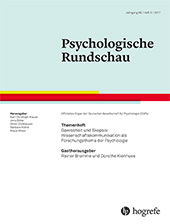Motivierte Wissenschaftsrezeption
Abstract
Zusammenfassung. Wir bezeichnen motivierte Wissenschaftsrezeption als ein Phänomen, bei dem motivationale Zustände die kognitive Verarbeitung wissenschaftlicher Evidenz auf eine Weise beeinflussen, die es dem Rezipienten erlaubt Schlussfolgerungen zu ziehen, die ihrerseits kongruent mit dem entsprechenden motivationalen Zustand sind. Im vorliegenden Beitrag wollen wir motivierte Wissenschaftsrezeption als ein psychologisches Phänomen beschreiben und auf der Basis sozialpsychologischer Konzepte und neuer empirischer Befunde aus dem Schwerpunktprogramm „Wissenschaft und Öffentlichkeit“ beleuchten. Dabei konzentrieren wir uns auf folgende Fragen: Worin äußert sich motivierte Wissenschaftsrezeption? Wie kann motivierte Wissenschaftsrezeption psychologisch erklärt werden? Welche Herausforderungen resultieren für die psychologische Forschung?
Abstract. We define motivated science reception as a phenomenon by which recipients’ motivational states influence how scientific evidence is processed, which, in turn, allows recipients to draw conclusions that are congruent with their respective motivational state. In this article, we conceptualize motivated science reception as a psychological phenomenon and discuss it on the basis of social psychological concepts and recent empirical evidence from the special priority program „Science and the General Public.“ We address the following questions: How does motivated science reception manifest itself? How can we explain motivated science reception theoretically? What are the challenges for psychological science that follow from motivated science reception?
Literatur
(2016). How Moral Threat Shapes Laypersons’ Engagement with Science. Personality and Social Psychology Bulletin, 42, 1723 – 1735. doi: 10.1177/0146167216671518
(2000). When beliefs yield to evidence: Reducing biased evaluation by affirming the self. Personality and Social Psychology Bulletin, 26, 1151 – 1164.
(2002). Motivated Reasoning and Performance on the was on Selection Task. Personality and Social Psychology Bulletin, 28, 1379 – 1387.
(1996). A disconfirmation bias in the evaluation of arguments. Journal of Personality and Social Psychology, 71 (1), 5 – 24.
(2010). System justification, the denial of global warming, and the possibility of “system-sanctioned change”. Personality and Social Psychology Bulletin, 36, 326 – 338.
(2011). Apocalypse soon? Dire messages reduce belief in global warming by contradicting just-world beliefs. Psychological Science, 22 (1), 34 – 38.
(2014). Gründe und Konsequenzen einer verzerrten Darstellung und Wahrnehmung sozialwissenschaftlicher Forschungsbefunde: Das Beispiel der „Killerspiele-Debatte“. Zeitschrift für Erziehungswissenschaft, 17, 101 – 117.
(2014). Intense acts of violence during video game play make daily life aggression appear innocuous: A new mechanism why violent video games increase aggression. Journal of Experimental Social Psychology, 50, 52 – 56.
(2012). Boomerang effects in science communication: How motivated reasoning and identity cues amplify opinion polarization about climate mitigation policies. Communication Research, 39, 701 – 723.
(2009). Feeling validated versus being correct: A meta-analysis of selective exposure to information. Psychological Bulletin, 135, 555 – 88.
(2006). The meaning maintenance model: On the coherence of social motivations. Personality and Social Psychology Review, 10, 88 – 110.
(2016). Motivated recall in the service of the economic system: The case of anthropogenic climate change. Journal of Experimental Psychology: General, 145, 755.
(2014). Seeking congruency or incongruency online? Examining selective exposure to four controversial science issues. Science Communication, 36 (2), 143 – 167.
(2009). Cultural cognition of the risks and benefits of nanotechnology. Nature Nanotechnology, 4 (2), 87 – 90.
(1996).
Motivated social cognition: Principles of the interface . In A. W. KruglanskiE. T. HigginsEds., Social psychology: Handbook of basic principles (pp. 493 – 520). New York, NY, US: Guilford Press.(1987). Motivated inference: Self-serving generation and evaluation of causal theories. Journal of Personality and Social Psychology, 53, 636 – 647.
(1990). The case for motivated reasoning. Psychological Bulletin, 108, 480 – 498.
(2011). The politicization of climate change and polarization in the American public’s views of global warming, 2001 – 2010. The Sociological Quarterly, 52, 155 – 194.
(2010). The scientific impotence excuse: Discounting belief-threatening scientific abstracts. Journal of Applied Social Psychology, 40, 579 – 600.
(2014). Gamers against science: The case of the violent video games debate. European Journal of Social Psychology, 44 (2), 104 – 116.
(2015). Social Identity Threat Motivates Science Discrediting Online Comments. PLoS ONE, 10 (2), e0117476.
(2016). The effects of social identity threat and social identity affirmation on laypersons’ perception of scientists. Public Understanding of Science, Advance online publication. doi:10.1177/0963662516631289
(2015). The Partisan Brain How Dissonant Science Messages Lead Conservatives and Liberals to (Dis)Trust Science. The Annals of the American Academy of Political and Social Science, 658 (1), 36 – 66.
(1987).
Toward an integration of cognitive and motivational perspectives on social inference: A biased hypothesis-testing model . In L. BerkowitzEd., Advances in Experimental Social Psychology (Vol. 20, pp. 297 – 340). New York: Academic Press.(1985). Maintaining Consistency between Self-Serving Beliefs and Available Data A Bias in Information Evaluation. Personality and Social Psychology Bulletin, 11, 179 – 190.
(2015). Public concerns about violent video games are moral concerns – How moral threat can make pacifists susceptible to scientific and political claims against violent video games. European Journal of Social Psychology, 45, 769 – 783.
(2002). Productive conflict in group decision making: genuine and contrived dissent as strategies to counteract biased information seeking. Organizational Behavior and Human Decision Processes 88, 563 – 586
(2012). Selecting science information in Web 2.0: How source cues, message sidedness, and need for cognition influence users’ exposure to blog posts. Journal of Computer-Mediated Communication, 18, 80 – 96.
(2005). Beyond STS: A research-based framework for socioscientific issues education. Science Education, 89, 357 – 377.



